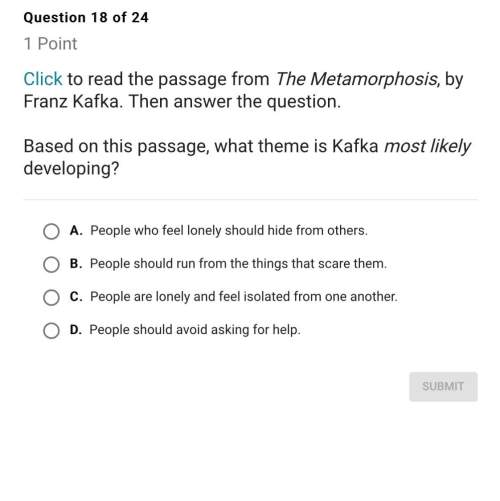
From the story"The Jungle" Why does the author most likely use the term it so frequently in paragraph 3? A full hour before the party reached the city they had begun to note the perplexing changes in the atmosphere. It grew darker all the time, and upon the earth the grass seemed to grow less green. Every minute, as the train sped on, the colors of things became dingier; the fields were grown parched and yellow, the landscape hideous and bare. And along with the thickening smoke they began to notice another circumstance, a strange, pungent odor. They were not sure that it was unpleasant, this odor; some might have called it sickening, but their taste in odors was not developed, and they were only sure that it was curious. Now, sitting in the trolley car, they realized that they were on their way to the home of it—that they had traveled all the way from Lithuania to it. It was now no longer something far off and faint, that you caught in whiffs; you could literally taste it, as well as smell it—you could take hold of it, almost, and examine it at your leisure. They were divided in their opinions about it. It was an elemental odor, raw and crude; it was rich, almost rancid, sensual, and strong. There were some who drank it in as if it were an intoxicant; there were others who put their handkerchiefs to their faces. The new emigrants were still tasting it, lost in wonder, when suddenly the car came to a halt, and the door was flung open, and a voice shouted—"Stockyards!" Answer choices for the above question A. To emphasize that the people on the train knew each other so well they could speak informally about the work they would soon undertake B. To emphasize that the people on the train were viewing plants and trees from the window that they did not know the names of C. To emphasize that the people on the train spoke a different language than the people living in the city from which they departed D. To emphasize that the people on the train were traveling in an unknown environment and could not identify a new odor

Answers: 1
Other questions on the subject: English

English, 21.06.2019 15:30, quantamagic
In the chaste adventures of joseph: a comedy, the garden outside the potiphar’s home symbolizes growth and natural beauty, and it highlights the
Answers: 3

English, 21.06.2019 20:00, keigleyhannah30
25 ! which three lines in this excerpt from phillis wheatley's poem "goliath of gath" contain examples of figurative language? the hosts on two opposing mountains stood, thick as the foliage of the waving wood; between them an extensive valley lay, o'er which the gleaming armour pour'd the day, when from the camp of the philistine foes, dreadful to view, a mighty warrior rose; in the dire deeds of bleeding battle skill'd,
Answers: 2

English, 22.06.2019 00:00, billy12008
Which of the following is an aspect of setting in a literary work? 1. time ii. place iii. social/historical context i only i and 11 ll and iii i, ii, and iii
Answers: 1

English, 22.06.2019 00:50, carastudies1686
Read the excerpt from part 3 of the call of the wild. but it was in giving the law and making his mates live up to it, that buck excelled. dave and sol-leks did not mind the change in leadership. it was none of their business. their business was to toil, and toil mightily, in the traces. so long as that were not interfered with, they did not care what happened. billee, the good-natured, could lead for all they cared, so long as he kept order. the rest of the team, however, had grown unruly during the last days of spitz, and their surprise was great now that buck proceeded to lick them into shape. what theme is most supported by the ideas in this excerpt? good leaders are strong and intelligent. loyalty can be a very powerful force. only the strong survive in the wilderness. we are all ruled by our natural instincts.
Answers: 3
Do you know the correct answer?
From the story"The Jungle" Why does the author most likely use the term it so frequently in paragrap...
Questions in other subjects:


Mathematics, 08.06.2021 01:00

Arts, 08.06.2021 01:00


Mathematics, 08.06.2021 01:00

Mathematics, 08.06.2021 01:00

Mathematics, 08.06.2021 01:00


Mathematics, 08.06.2021 01:00

Chemistry, 08.06.2021 01:00







